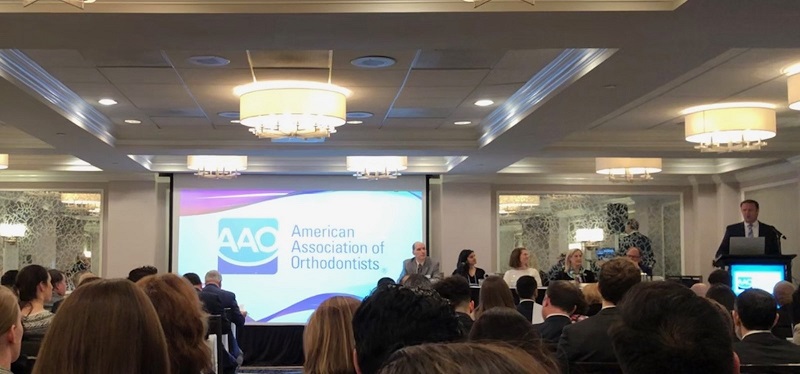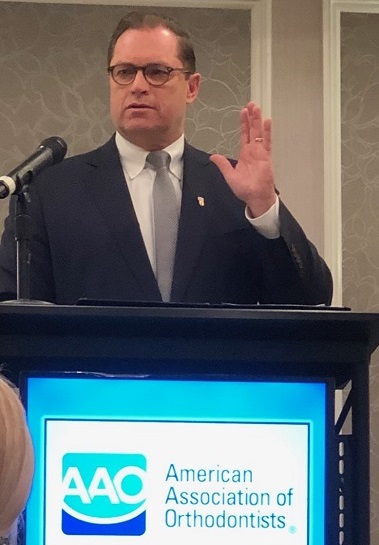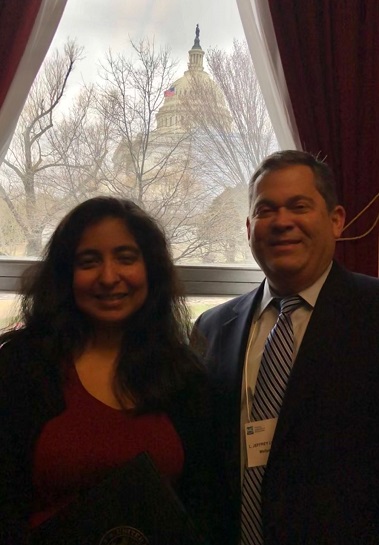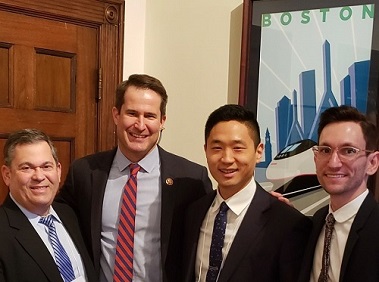
L. Jeffrey Lowenstein, DMD
AAO IN DC: AN UPDATE
The AAO’s 2020 legislative priorities have focused on easing the burden of student loan debt, keep borrowing affordable, strengthen repayment options, and preserve access to federal loans and grants for graduate and all professional students. With respect to orthodontic practice concerns, the legislative agenda includes improving healthcare policy, strengthening and expanding consumer-directed healthcare options by passing the RAISE Act, expanding health coverage options for small businesses, improving access to high-quality dental care, adopting reforms for small businesses, and supporting growth of small businesses through tax policy.
The 2020 AAO Advocacy Conference was held February 25-26 in Washington, DC. Over 125 AAO members attended (over 50 of which were residents of orthodontic programs) who represented all eight constituencies and reacted very positively to the overall advocacy conference experience.
The following bills were discussed at great length by orthodontists and the orthodontic residents with members of Congress and/or their legislative staff:
RAISE Health Benefits Act (S.503/H.R.1366) was reinforced during the formal visits with members of Congress. This bill modifies the tax exclusion for distributions from health flexible spending arrangements provided to employees under a cafeteria plan to (1) increase the annual limit on employee salary reduction contributions to $5,000, with an additional $500 for each additional employee dependent above two dependents that has not been taken into account by another person for the year; (2) revise the adjustment for inflation after 2019; and (3) allow a carryforward into the next year for unused amounts in such plans.
Ensuring Lasting Smiles Act (H.R. 1379/S.560) has been overwhelmingly supported by both Senators and Representatives alike. This legislation would require all group health plans to cover medically necessary dental, orthodontic, and prosthodontic care related to the diagnosis or treatment of a congenital anomaly or birth defect. This bill will amend the Public Health Service Act, the Employee Retirement Income Security Act of 1974, and the Internal Revenue Code of 1986 to require that group and individual health insurance coverage and group health plans provide coverage for treatment of a congenital anomaly or birth defect.
Competitive Health Insurance Reform Act (H.R. 1418/S.350) easily passed the House last session and has been reintroduced again in both the Senate and the House. This bill declares that nothing in the McCarran-Ferguson Act modifies, impairs, or supersedes the operation of antitrust laws with respect to the business of health insurance, including the business of dental insurance. This declaration does not apply to a contract, combination, or conspiracy to (1) collect, compile, or disseminate historical loss data; (2) determine a loss development factor for historical loss data; (3) perform actuarial services if the collaboration does not involve a restraint of trade; or (4) develop or disseminate a standard insurance policy form if adherence to the form is not required. Prohibitions against unfair methods of competition apply to the business of health insurance without regard to whether the business is for profit.
With the average graduating orthodontic resident today owing approximately $428,150 in student loan debt, a major presentation was made to Congress. Current federal student loan policy does not really account for a professional’s ability to repay student loans, resulting in policies that compound the student loan crisis and undermine a federal goal to expand the number of medical professionals in the United States. The Resident Education Deferred Interest Act (REDI Act) (H.R. 1554) was reintroduced. This legislation would provide for interest-free deferment on student loans for borrowers serving in a medical or dental internship or residency programs. The Student Loan Recalculation and Refinancing Act (H.R. 1899) would preserve the in-school interest subsidy, reduce origination fees and borrowing rates, provide for federal student loan refinancing, and allow for residency deferments. The Student Loan Refinancing Act (H.R. 2186) would allow for borrowers to refinance their student loans when borrowing rates are reduced. The Student Loan Tax Elimination Act (S.1696) would eliminate origination fees on all federal Direct Loans. The Dental Loan Repayment Assistance Act (H.R. 996/S.359) would exclude certain federal loan repayments made to dental faculty from being included as gross income and prevent a potentially hefty tax bill on those federal loan repayments defined in the Public Health Service Act. Expanding Access to Graduate Education Act of 2019 (H.R. 3334) would permit the use of remaining Pell eligibility towards graduate programs.
Please remember, when you contact your representative in the US House of Representatives and/or your US Senator to advocate for a specific bill before congress, please identify the bill by its number. You may email, call or visit with your representative or a staff member anytime and anywhere. Many representatives hold local events where citizens can approach them and discuss specific bills and concerns. It is best to always follow-up with an email or a phone call. Advocacy is best accomplished in large numbers, so please participate. All of the legislative priorities of the AAO will not only benefit orthodontists and orthodontic residents, but also our patients and the entire dental profession. The time is now to advocate for our profession!
 |
|
 |
 |
 |
 |
